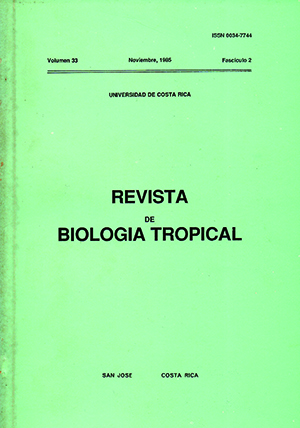Abstract
Gliricidia sepium blooms in the lowlands of Guanacaste, Costa Rica from December to february and sets the pods from February to May. In the Central Valley, it bloom s with a two month delay, thus, blooming occurs simultaneously in both areas in February. Leaf fall begins in December and new leaf primordial develop in February. Germination is epigeal, phanerocotylar and begins between 48-96 hours after the beginning of the imbibition of the seed. The stem reaches a length of 25-30 cm after 4S days and secondary growth begins between 38-43 days of the initiation of germination.
References
Holdridge, L. R., & L.J. Poveda, 1975. Arboles de Costa Rica. Vol. l. Centro Científico Tropical. San José, Costa Rica. 546 p.
Inostroza, I. 1981. Efecto alelopático de Gliricidia sepium. Tesis de Licenciatura en Biología, San Pedro de Montes de Oca, Universidad de Costa Rica, San José, Costa Rica. 45 p.
Jurd, L. 1976. A phenolic isoflav -3- ene from Gliricidia sepium. Tetrahedron Letters, 21: 1742-1744.
Little, E.L., & F.H. Wadsworth. 1964. Common Trees of Puerto Rico and the Virgin Islands. Agriculture Handbook No. 249. USDA Forest Service. Washington, D.C. 548 p.
Manners, G.D. & L. Jurd. 1979. Additional flavonoids in Gliricidia sepium. Phytochemistry, 18: 1037-1042.
Pennington, T.D. & J. Sarukhan. 1968. Arboles tropicales de México. Instituto Nal. de Investigaciones Forestales, Secretaría de Agricultura y Ganadería, México. 413 p.
Standley, P.C. 1937. Flora of Costa Rica. Vol. 18. Field Museum of Natural History, Chicago. 780 p.
##plugins.facebook.comentarios##

This work is licensed under a Creative Commons Attribution 4.0 International License.
Copyright (c) 1985 Revista de Biología Tropical


